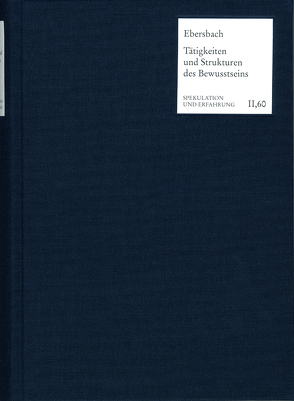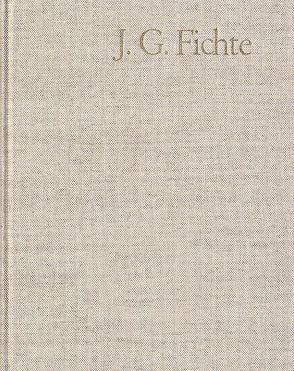
Die ›Thatsachen des Bewußtseins‹ vom Januar 1813 mit dem Hauptgewicht auf den praktischen Tatsachen und ihrer Begründung führen vorbereitend in die unvollendet gebliebene ›Wissenschaftslehre‹ vom Februar 1813 ein. Diese setzt bei der Einsicht an, dass alles Wissen nur im Verständnis seiner selbst ist. Aus diesem Verstehen des Verstehens werden die weiteren Prinzipien des Wissens hergeleitet. Das erstmals veröffentlichte Diarium I (März-August 1813) dokumentiert Fichtes ›Werkstattarbeit‹ für die Vorlesung der sogenannten Staatslehre mit ihren geschichtsphilosophischen und politischen Reflexionen. Außerdem nehmen darin Spekulationen zu letzten Begründungszusammenhängen der Wissenschaftslehre großen Raum ein.
The primary focus of ›The Facts of Consciousness‹ (January 1813) is on practical facts and their justification, and provides an introductory platform for the incomplete ›Wissenschaftslehre‹ of February 1813. Its point of departure is that all cognition is merely an understanding of itself. The further principles of cognition are then derived from this understanding of understanding. The ›Diarium I‹ (March-August 1813) is here published for the very first time, and offers a glimpse into Fichte’s preparatory work for his lectures on Political Theory (Staatslehre) with their mixture of historical-philosophical and political reflections. Furthermore, ample space is devoted to speculations on an ultimate grounding of the Wissenschaftslehre.
Aktualisiert: 2020-09-03
Autor:
Johann Gottlieb Fichte,
Erich Fuchs,
Hans Gliwitzky,
Reinhard Lauth,
Hans Georg von Manz,
Günter Meckenstock,
Ives Radrizzani,
Erich Ruff,
Peter K. Schneider,
Martin Siegel,
Günter Zöller
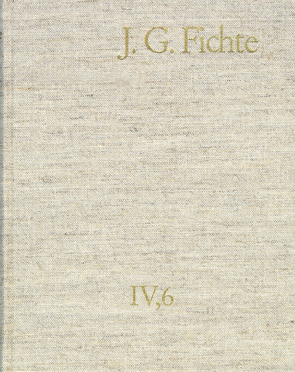
Auch Fichtes in seinen letzten Lebensjahren gehaltene Vorlesungen sind von den Transformationen der Spätlehre betroffen: Vorlesungen bzw. bei aller Komplexität recht knappe Vorbereitungstexte wie die ›Rechtslehre‹ und ›Sittenlehre‹ von 1812 (Bd. II,13), die ›Thatsachen des Bewußtseins‹ sowie mehrere Ansätze zur Ausarbeitung der ›Wissenschaftslehre‹ aus den Jahren 1813 und 1814 erfahren durch die hier vorgelegten studentischen Nachschriften bedeutende Verständnishilfe. Besonderes Interesse darf eine Nachschrift der umfangreichen ›Einleitung in die WL‹ beanspruchen, die bisher unveröffentlicht ist - gefolgt von fünf Vorlesungen zur ›Wissenschaftslehre‹ von 1814, denen Fichtes Tod ein Ende setzte.
The student transcripts of this volume considerably facilitate our understanding of Fichte’s difficult and terse preparatory texts. This not only holds for the revised lectures of the later works on the ›Rechtslehre‹ and ›Sittenlehre‹ of 1812, but also for ›The Facts of Consciousness‹ and the ›Wissenschaftslehre‹ (both from early 1813), the ›Introduction to the Wissenschaftslehre‹ (Fall, 1813) and the 1814 ›Wissenschaftslehre‹. The lecture transcript entitled ›Darstellung des Christenthums‹ documents a portion of the lectures on the ›Staatslehre‹. Because of its various hypothetical approaches to the elements that constitute consciousness, ›The Facts of Consciousness‹ merely serves as an introduction to the ›Wissenschaftslehre‹. Whereas it is the task of the ›Wissenschaftslehre‹ itself to supply a complete deduction of the cognitive presuppositions of these elements within a systematic framework. War forced the suspension of these lectures, and in winter 1813/14 Fichte renewed his attempt. Of these there is extant a hitherto unpublished transcript of a comprehensive ›Introduction‹, followed by five lectures from the 1814 ›Wissenschaftslehre‹. The latter was cut short by Fichte’s death.
Aktualisiert: 2020-09-03
Autor:
Matteo V D'Alfonso,
Faustino Fabianelli,
Johann Gottlieb Fichte,
Erich Fuchs,
Antonie Magen,
Hans Georg von Manz,
Ives Radrizzani,
Peter K. Schneider,
Martin Siegel,
David W. Wood,
Günter Zöller
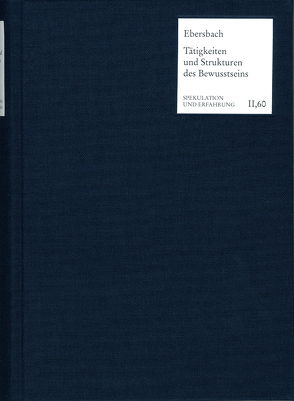
Vorbereitend auf die ›Wissenschaftslehre‹ hat Fichte in Berlin begonnen, eine Vorlesung namens ›Thatsachen des Bewußtseyns‹ zu halten. Darin untersucht er den Zusammenhang der einzelnen, faktischen Bewusstseinsmomente und -vollzüge zum Ganzen des Wissens, das die ›Thatsachen‹ darstellen sollen. Indem das Bewusstsein den Blick von den Objekten auf die eigene Tätigkeit und deren gesetzliche Struktur wendet, soll es lernen, worin Wissen überhaupt besteht. Die bislang wenig rezipierte Vorlesung etabliert damit den Gegenstand der ›Wissenschaftslehre‹ und ist so eine sachlich notwendige Hinführung zum Kernstück von Fichtes Philosophie. Mit dieser Arbeit liegt die erste umfassende Interpretation der ›Thatsachen‹ von 1810/11 vor, eine Art Reiseführer zu der Bewusstseinsreise, zu der Fichte seine Hörer und Leser einlädt.
In Berlin, Fichte began holding a lecture called ›Facts of Consciousness‹ as a preliminary to his ›Wissenschaftslehre‹. It served to illustrate knowledge as a whole: Fichte analyses the relations between the specific factual aspects of consciousness and how they constitute knowledge. By learning to focus not on objects but on its own actions and the laws governing those actions, consciousness establishes the concept of knowledge, the topic of the ›Wissenschaftslehre‹. In this sense, the too little received ›Facts of Consciousness‹ serve as an introduction to the heart of Fichte’s philosophy. – In this book, Ebersbach offers the first comprehensive interpretation of the ›Facts of Consciousness‹ (1810/11). Fichte invites his students to a journey of consciousness – this book serves as a travel guide to this journey.
Aktualisiert: 2021-01-13
> findR *
In Berlin, Fichte began holding a lecture called ›Facts of Consciousness‹ as a preliminary to his ›Wissenschaftslehre‹. It served to illustrate knowledge as a whole: Fichte analyses the relations between the specific factual aspects of consciousness and how they constitute knowledge. By learning to focus not on objects but on its own actions and the laws governing those actions, consciousness establishes the concept of knowledge, the topic of the ›Wissenschaftslehre‹. In this sense, the too little received ›Facts of Consciousness‹ serve as an introduction to the heart of Fichte’s philosophy. – In this book, Ebersbach offers the first comprehensive interpretation of the ›Facts of Consciousness‹ (1810/11). Fichte invites his students to a journey of consciousness – this book serves as a travel guide to this journey.
Aktualisiert: 2019-07-09
> findR *
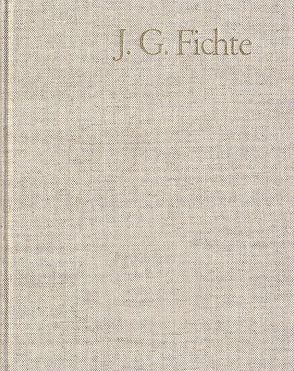
The student transcripts of this volume considerably facilitate our understanding of Fichte’s difficult and terse preparatory texts. This not only holds for the revised lectures of the later works on the ›Rechtslehre‹ and ›Sittenlehre‹ of 1812, but also for ›The Facts of Consciousness‹ and the ›Wissenschaftslehre‹ (both from early 1813), the ›Introduction to the Wissenschaftslehre‹ (Fall, 1813) and the 1814 ›Wissenschaftslehre‹. The lecture transcript entitled ›Darstellung des Christenthums‹ documents a portion of the lectures on the ›Staatslehre‹. Because of its various hypothetical approaches to the elements that constitute consciousness, ›The Facts of Consciousness‹ merely serves as an introduction to the ›Wissenschaftslehre‹. Whereas it is the task of the ›Wissenschaftslehre‹ itself to supply a complete deduction of the cognitive presuppositions of these elements within a systematic framework. War forced the suspension of these lectures, and in winter 1813/14 Fichte renewed his attempt. Of these there is extant a hitherto unpublished transcript of a comprehensive ›Introduction‹, followed by five lectures from the 1814 ›Wissenschaftslehre‹. The latter was cut short by Fichte’s death.
Aktualisiert: 2019-08-19
Autor:
Matteo V D'Alfonso,
Faustino Fabianelli,
Johann Gottlieb Fichte,
Erich Fuchs,
Antonie Magen,
Hans Georg von Manz,
Ives Radrizzani,
Peter K. Schneider,
Martin Siegel,
David W. Wood,
Günter Zöller
The primary focus of ›The Facts of Consciousness‹ (January 1813) is on practical facts and their justification, and provides an introductory platform for the incomplete ›Wissenschaftslehre‹ of February 1813. Its point of departure is that all cognition is merely an understanding of itself. The further principles of cognition are then derived from this understanding of understanding. The ›Diarium I‹ (March-August 1813) is here published for the very first time, and offers a glimpse into Fichte’s preparatory work for his lectures on Political Theory (Staatslehre) with their mixture of historical-philosophical and political reflections. Furthermore, ample space is devoted to speculations on an ultimate grounding of the Wissenschaftslehre.
Aktualisiert: 2020-04-22
Autor:
Johann Gottlieb Fichte,
Erich Fuchs,
Hans Gliwitzky,
Reinhard Lauth,
Hans Georg von Manz,
Günter Meckenstock,
Ives Radrizzani,
Erich Ruff,
Peter K. Schneider,
Martin Siegel,
Günter Zöller
MEHR ANZEIGEN
Bücher zum Thema Thatsachen des Bewußtseyns
Sie suchen ein Buch über Thatsachen des Bewußtseyns? Bei Buch findr finden Sie eine große Auswahl Bücher zum
Thema Thatsachen des Bewußtseyns. Entdecken Sie neue Bücher oder Klassiker für Sie selbst oder zum Verschenken. Buch findr
hat zahlreiche Bücher zum Thema Thatsachen des Bewußtseyns im Sortiment. Nehmen Sie sich Zeit zum Stöbern und finden Sie das
passende Buch für Ihr Lesevergnügen. Stöbern Sie durch unser Angebot und finden Sie aus unserer großen Auswahl das
Buch, das Ihnen zusagt. Bei Buch findr finden Sie Romane, Ratgeber, wissenschaftliche und populärwissenschaftliche
Bücher uvm. Bestellen Sie Ihr Buch zum Thema Thatsachen des Bewußtseyns einfach online und lassen Sie es sich bequem nach
Hause schicken. Wir wünschen Ihnen schöne und entspannte Lesemomente mit Ihrem Buch.
Thatsachen des Bewußtseyns - Große Auswahl Bücher bei Buch findr
Bei uns finden Sie Bücher beliebter Autoren, Neuerscheinungen, Bestseller genauso wie alte Schätze. Bücher zum
Thema Thatsachen des Bewußtseyns, die Ihre Fantasie anregen und Bücher, die Sie weiterbilden und Ihnen wissenschaftliche
Fakten vermitteln. Ganz nach Ihrem Geschmack ist das passende Buch für Sie dabei. Finden Sie eine große Auswahl
Bücher verschiedenster Genres, Verlage, Autoren bei Buchfindr:
Sie haben viele Möglichkeiten bei Buch findr die passenden Bücher für Ihr Lesevergnügen zu entdecken. Nutzen Sie
unsere Suchfunktionen, um zu stöbern und für Sie interessante Bücher in den unterschiedlichen Genres und Kategorien
zu finden. Unter Thatsachen des Bewußtseyns und weitere Themen und Kategorien finden Sie schnell und einfach eine Auflistung
thematisch passender Bücher. Probieren Sie es aus, legen Sie jetzt los! Ihrem Lesevergnügen steht nichts im Wege.
Nutzen Sie die Vorteile Ihre Bücher online zu kaufen und bekommen Sie die bestellten Bücher schnell und bequem
zugestellt. Nehmen Sie sich die Zeit, online die Bücher Ihrer Wahl anzulesen, Buchempfehlungen und Rezensionen zu
studieren, Informationen zu Autoren zu lesen. Viel Spaß beim Lesen wünscht Ihnen das Team von Buchfindr.



